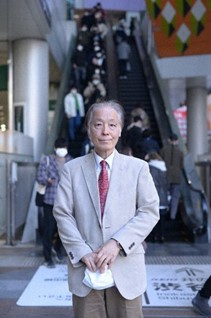
March 1, 2021
TOKYO February 28, 2021 (Mainichi Japan)
-- Various estimates regarding the economic effects of this summer's Tokyo Olympics and Paralympics have been disclosed by experts, private think tanks, and other parties. The common perception is that there will be more benefit in holding the games than canceling them, though estimates range widely from 3 trillion to as much as 100 trillion yen (about $28.5 billion to $949 billion).
The Mainichi Shimbun sat down with Yoshihiko Senoo, an economist and research adviser for the Land Institute of Japan and former member of the now-defunct Economic Planning Agency, to talk about the reliability of such economic estimates for the Tokyo Games.
The following are excerpts from Senoo's remarks to the Mainichi.
***
When it is decided which countries will host the Olympics and Paralympics or any other international sports events, such as the soccer and rugby world cups, various estimates regarding their economic benefits are announced. However, distrust of such estimates is deeply rooted among economic experts. Stefan Szymanski, a sports economics professor at the University of Michigan, went as far as to assert that there are no decent academic papers that prove that sports events generate an economic windfall.
One reason for such distrust is that many of the estimates jumble together expected revenue and necessary expenses. For example, say there is an endeavor with an expected revenue of 5 billion yen (about $47.5 million) following an investment of 100 billion yen (about $949 million). In terms of economic effects, the figure of 5 billion yen should be brought into focus, but for sporting events, expenses tend to be lumped together with the expected revenue. So in this case, estimates might state the economic impact is 105 billion yen (about $996 million). This gives people excessively high expectations for the project's economic effects.
Another factor contributing to distrust is that expected revenue figures tend to be overestimated. Direct effects are generated through investment in arrangements for stadiums and management of the event. Afterwards, indirect effects surface as a result of the behavior of consumers who come to see the competition, which I think is where overly high estimates are formed.
Every estimate seems to use the multiplier effect, which indicates ripple effects in economics, and input-output tables, which serve as the foundation of statistics, to calculate indirect effects.
However, it is unknown how many indirect effects are included. Criticism has emerged among economists that such estimates "tend to count anything as economic effects." Some estimates even include what they call the "dream effect," or the effect of loosening the purse strings of the public as the overall mood is boosted due to the hosting of the games. When taken this far, there's no choice but to question the validity of the estimates.
Let's have a look at the actual numbers announced by the Tokyo Games bidding committee in 2012. The economic impact between 2013 and 2020 was estimated at a total of 3 trillion yen. Although this figure is more modest compared to estimates that put the economic outlook at 100 trillion yen, doubts still remain. According to the estimate, 1.67 trillion yen of the 3 trillion yen profit was attributed to Tokyo and the remaining 1.29 trillion yen to local regions. If the games are held, there may be people who visit venues in local regions, but it seems that the estimated profit for areas other than Tokyo is set too high.
Even though the estimates should be taken with a grain of salt, there may be people who believe that it's better for the economy to hold the Olympics than to cancel them. However, there is a common perception among many economists that the economic effect of hosting the Olympics and Paralympics is limited for developed nations.
If Japan's economy were in a phase of growth, like during the previous 1964 Tokyo Olympics, it could be expected that the games would stimulate the economy. However, such effects are extremely limited in these current times when revenue is not increasing. Even if special demand arises for the games, people will only cut down on other expenses. If so, there will hardly be any impact on the economy as a whole. It may be better to place value on the Olympics and Paralympics as a "festival of sports" rather than on their economic impact.
(Photo:Yoshihiko Senoo, an economist and former official at the now-defunct Economic Planning Agency, is seen in Tokyo's Shibuya Ward on Feb. 4, 2021. )
© Baseball Federation of Asia. All RIGHTS RESERVED. / PRIVACY POLICY